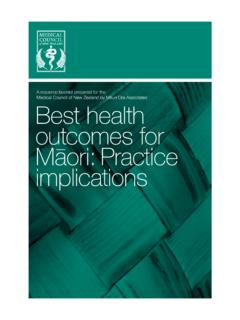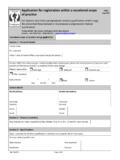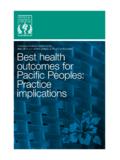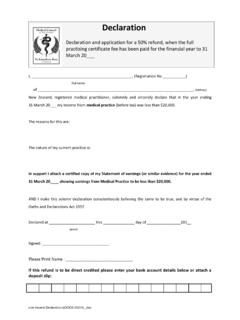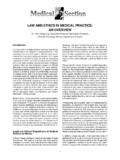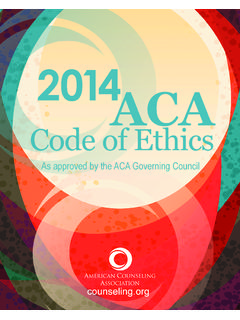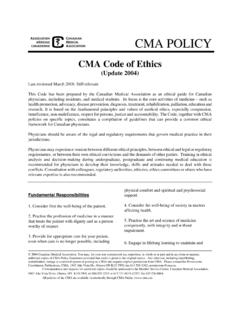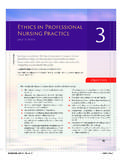Transcription of GOOD MEDICAL PRACTICE - Medical Council of New Zealand
1 good MEDICALPRACTICEM edical Council of New Zealand , December 2016TE KAUNIHERA RATA O AOTEAROA MEDICAL Council OF NEW ZEALANDP rotecting the public, promoting good MEDICAL PRACTICE Te tiaki i te iwi wh nui me te whakatairanga pai i te mahi e p ana ki te taha rongo Patients are entitled to good doctors. good doctors make the care of patients their first concern; they are competent, keep their knowledge and skills up to date, establish and maintain good relationships with patients and colleagues, are honest and trustworthy and act principal purpose of the MEDICAL Council of New Zealand is to protect the health and safety of the public by providing mechanisms to ensure doctors are competent and fit to practise. The Council has the following key functions: registering doctors determining qualifications prescribing scopes of PRACTICE setting standards and supporting doctors to uphold these standards recertifying and promoting lifelong learning for doctors reviewing the PRACTICE of doctors if there is a concern about performance, professional conduct or health accrediting training institutions including MEDICAL schools, colleges of medicine and hospitals.
2 About good MEDICAL PracticeUnder section 118(i) of the Health Practitioners Competence Assurance Act 2003, a function of the MEDICAL Council is to set standards of clinical competence, cultural competence and ethical conduct for doctors. Under Right 4 of the Code of Health and Disability Service Consumers Rights patients also have the right to have services provided that comply with legal, professional, ethical and other relevant standards. The Council has developed good MEDICAL PRACTICE to be the foundation document for these standards. The standards detailed in good MEDICAL PRACTICE , and in other Council statements, are those which the public and the profession expect a competent doctor to meet and have been developed through discussion with the public and the profession. Where relevant, good MEDICAL PRACTICE also provides guidance to assist doctors understand, and comply with, the requirements of legislation.
3 good MEDICAL PRACTICE is not intended to be exhaustive. There may be obligations or situations that are not expressly provided for. In such circumstances, a doctor s first priority should always be the care of his or her patient. good MEDICAL PRACTICE is not a Code of Ethics it does not seek to describe all the ethical values of the profession or to provide specific advice on ethical issues, ethical frameworks and ethical decision-making. This type of advice is provided by the New Zealand MEDICAL MEDICAL PRACTICE is addressed to doctors, but is also intended to let the public know what they can expect from good MEDICAL PRACTICE applies to you For MEDICAL students, good MEDICAL PRACTICE identifies the basic duties of a good doctor and serves as a source of education and reflection. For doctors, good MEDICAL PRACTICE serves as a basis for you to monitor, and reflect on, your own conduct and that of your colleagues.
4 The Health Practitioners Disciplinary Tribunal, the Council s Professional Conduct Committees and the Health and Disability Commissioner may use good MEDICAL PRACTICE as a standard by which to measure your professional conduct. For patients, good MEDICAL PRACTICE provides guidance for assessing the minimum ethical and clinical conduct expected of directives outlined in good MEDICAL PRACTICE are usually duties and must be followed. However, we recognise that not all duties will apply in all situations. Sometimes there are factors outside a doctor s control that affect whether or not, or how, he or she can comply with some standards. Throughout this resource we have used the term you should (rather than a more directive term such as you must ) to indicate where this is the you believe that a doctor is not meeting standards outlined in good MEDICAL PRACTICE , you should raise your concerns with the doctor, draw that matter to the attention of the doctor s employer, or report your concerns to the Registrar of the MEDICAL Council1 or the Office of the Health and Disability Commissioner2, or in the event of matters related to health information privacy and security - the Office of the Privacy Commissioner Telephone 0800 286 801 or email For more information, refer to the Fitness to PRACTICE page of the Council s website, Telephone 0800 11 22 33 or email For more information, refer to Telephone 0800 80 39 09, or email For more information, refer to trust their doctors with their health and wellbeing, and sometimes their lives.
5 To justify your patients trust, follow the principles outlined below and the duties outlined in the rest of this for patients Make the care of patients your first and promote the health of patients and the patientsAim to establish a relationship of trust with each of your aware of cultural diversity, and function effectively and respectfully when working with and treating people of different cultural patients as individuals and respect their dignity by: treating them with respect respecting their right to confidentiality and in partnership with patients and colleaguesWork in partnership with patients by: listening to them and responding to their concerns and preferences giving them the information they want or need in a way they can understand and ensuring they understand it respecting their right to reach decisions with you about their treatment and care supporting them in caring for themselves to improve and maintain their the trust of colleagues, and treat them with colleagues in ways that best serve patients interestsActing honestly and ethically Be honest and open when working with patients.
6 Act ethically and with integrity by: acting without delay to prevent risk to patients acting without delay if you have good reason to believe that a colleague may be putting patients at risk never discriminating unfairly against patients or colleagues never abusing your patients trust in you or the public s trust of the cooperatively with, and be honest, open and constructive in your dealings with managers, employers, the MEDICAL Council , and other the obligation to maintain and improve standardsAct in accordance with relevant standards. Keep your professional knowledge and skills up to dateRecognise, and work within, the limits of your competence. Be committed to autonomous maintenance and improvement in your clinical standards in line with best evidence-based reflectiveness, personal awareness, the ability to seek and respond constructively to feedback and the willingness to share your knowledge and to learn from a responsibility for maintaining the standards of the that you are personally accountable for your professional PRACTICE you must always be prepared to explain your decisions and of professionalism1.
7 The Council expects doctors to be competent in: caring for patients respecting patients working in partnership with patients and colleagues acting honestly and ethically accepting the obligation to maintain and improve standards In the sections that follow, we outline the requirements of each of these areas of for patients PrinciplesMake the care of patients your first and promote the health of patients and the good clinical care 2. When you assess, diagnose or treat patients you must provide a good standard of clinical care. This includes: adequately assessing the patient s condition, taking account of the patient s history and his or her views, reading the patient s notes and examining the patient as appropriate4 providing or arranging investigations or treatment when needed taking suitable and prompt action when needed, and referring the patient to another practitioner or service when this is in the patient s best In providing care you are expected to5: provide effective treatments based on the best available evidence consult and take advice from colleagues when appropriate take steps to alleviate pain and distress whether or not a cure is PRACTICE in an environment of resource limitation4.
8 Strive to use resources efficiently, consistent with good evidence based patient care, and balance your duty of care to each patient with your duty of care to the community and wider See the Council s statement on Non-treating doctors performing MEDICAL assessments of patients for third parties, which outlines the specific requirements for non-treating doctors performing MEDICAL assessments for other See the Council s statement on Telehealth for information about providing services electronically or from a For more information, see the Council s statement on Safe PRACTICE in an environment of resource records75. You must keep clear and accurate patient records that report: relevant clinical information options discussed decisions made and the reasons for them information given to patients the proposed management plan any medication or other treatment Make these records at the same time as the events you are recording or as soon as possible Take all reasonable steps to ensure that records containing personal data about patients, colleagues or others are kept systems8.
9 Your administrative systems must support the principles and standards contained within good MEDICAL medication or treatment89. You may prescribe medication or treatment, including repeat prescriptions, only when you: have adequate knowledge of the patient s health are satisfied that the medication or treatment are in the patient s best Before prescribing any medicine for the first time to a patient, Council expects you to have an in-person consultation with the patient. If that is not possible because of exceptional circumstances,9 consider a video consultation10 with the patient11 or discuss the patient s treatment with another New Zealand registered health practitioner who can verify the patient s physical data and identity. When these options are not possible or practical, it 7 See the Council s statement on The maintenance and retention of patient records8 See the Council s statement on good prescribing Examples of exceptional circumstances include the urgency of the clinical situation or the unavailability of a doctor.
10 It is good PRACTICE to document in the patient s clinical notes, the mode of the consultation and the reasons for not conducting an in-person consultation before prescribing any medication for the first time to a Video consultation refers to situations where the doctor and patient use information and video conferencing technologies to communicate with each other and visual and audio information are exchanged in real time but the doctor and patient are not physically present in the same consultation room. Video consultations can be conducted between a doctor and patient in the presence of their general practitioner or other health practitioner or it can be conducted with no MEDICAL support at the patient s If you conduct a video consultation, you must take extra care to ensure that a physical examination of the patient is not necessary.
